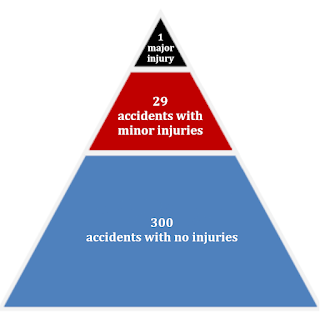There are many kinds of issues that can crop up on a Twitch stream. Sometimes they’re due to things completely out of your control, like internet outages or mechanical parts going bad. But more often, issues occur because of our own errors, whether we forget to do something before the show starts, we miss our scheduled days, or we neglect to change the name of the game we’re playing when we switch mid-stream. We often think that these are due to our forgetfulness or laziness, but this way of thinking is only scratching the surface of the real problem. If you want to truly prevent problems from occurring on your stream due to your own errors, the best solution is discipline and structure.
➢ ACCIDENT PREVENTION
Every time you skip one of your prep steps,
you're edging closer to disaster.
In 1931, a man named Herbert William Heinrich proposed a pretty radical concept in the field of workplace health and safety. According to Heinrich, serious workplace injuries weren’t freak occurrences- they could be plotted scientifically, to a relatively high degree of certainty, based on the number of less serious accidents leading up to them. He released a figure, which stated that for every one accident with a major injury within a company, there would be 29 accidents with minor injuries which occurred beforehand. And every 29 accidents with minor injuries would be preceded by 300 accidents with no injuries. This concept became known as ‘The Accident Triangle,’ and led to a revolutionary idea in workplace safety: if you could cut down on the amount of tiny accidents that didn’t result in any injuries, that would also cause the number of large, injury-causing accidents to begin falling.
And this makes perfect sense if you think about it. We make mistakes every day, and usually the one time we really screw something up isn’t as much an accident as it is the result of bad habits. In the entry Strengthen Your Twitch Habits, I described a problem I had which would perfectly fit into this format. When I was in college, I would often lock myself out of my dorm room by forgetting to bring my keys with me. It’s easy to think this is a problem with memory, i.e., “If I remember to take the keys, I won’t lock myself out.” But this is superficial thinking, and totally impractical. We can’t simply will ourselves to remember things better. Instead, I realized that the one time every few months that I’d forget my keys wasn’t actually the problem. The problem actually existed in the bad habit leading up to the mistake: the hundred instances when I wouldn’t properly check whether I had the keys before I went out. Just because the accident didn’t happen in those hundred instances doesn’t mean they didn’t contribute to the accident that ended up occurring. So I created a very strict habit and stuck to it. It didn’t matter whether I had literally just put my keys in my pocket- every time I left the room, with no exceptions, I would stop the door with my foot, take the keys out of my pocket, and have to be looking straight at them before allowing the door to close. In the ten or so years since creating this habit, I never locked myself out of a dorm, apartment or hotel room ever again. I solved my problem according to The Accident Triangle, though I didn’t know what that was at the time. By preventing the small, innocuous accident from occurring (in this case, when I’d neglect to check whether I had my keys, but didn’t forget them) I was able to completely remove the larger accident (instances where I actually would forget the keys).
➢ STREAM KEYS
Don't forget your keys.
You can imagine how this thinking would help you to be more consistent on Twitch. But first, it’s necessary to take responsibility for what happens to you. Many things might seem to be outside of your control, but it’s possible to prevent them if you prepare. Don’t let yourself get painted into a corner. What small decisions do you make every day that allow even the problems that seem most outside of your control to occur? Let’s say a part broke on your PC. Were there any warning signs while using it? When was the last time you checked the inside of the case? Or maybe your internet went out. Who else is using the network? Is it a scheduled maintenance time? Are you sure your Twitch bandwidth settings are low enough? Do you have a phone you can go live from instead? No matter the error, there are always steps you can take to either prevent the problem from happening, or mitigate its negative effects.
You can see how I set up some of my own systems in the entry Creating a Pre-Stream Checklist, and then its follow-up, Perfecting Your Pre-Stream Checklist. In those entries, I talk about how to break your process down into its component parts, and then put it back together in blueprint form, so the instructions can be followed the exact same way every time. Then I show you how to identify problems with the blueprints you’ve created, and how to shift things around to find potentially unexpected solutions. Finally, I go into how to deal with problems that are guaranteed to happen a certain percentage of the time, as well as how to sidestep them so they don’t catch you off guard.
➢ HABITS AND SYSTEMS
There are a lot of things on Twitch that require you to make complex decisions, like responding to a comment, designing the look and feel of your brand, or creating your streaming space for the first time. But for every nuanced choice, there are ten other little tasks that need no analytical thinking at all. Following your schedule, setting up the stream before each live session, and sticking to various habits are all things which require nothing but your unchanging and unflinching compliance. These things can, and should, be automated. Because leaving them up to chance is only asking for mistakes to happen. There’s a quote commonly attributed to Aristotle: “We are what we repeatedly do. Excellence is not an act, but a habit.” And if you can stick to your systems even when no visible problems are occurring, you’ll cut down on stream errors in the future.





No comments:
Post a Comment